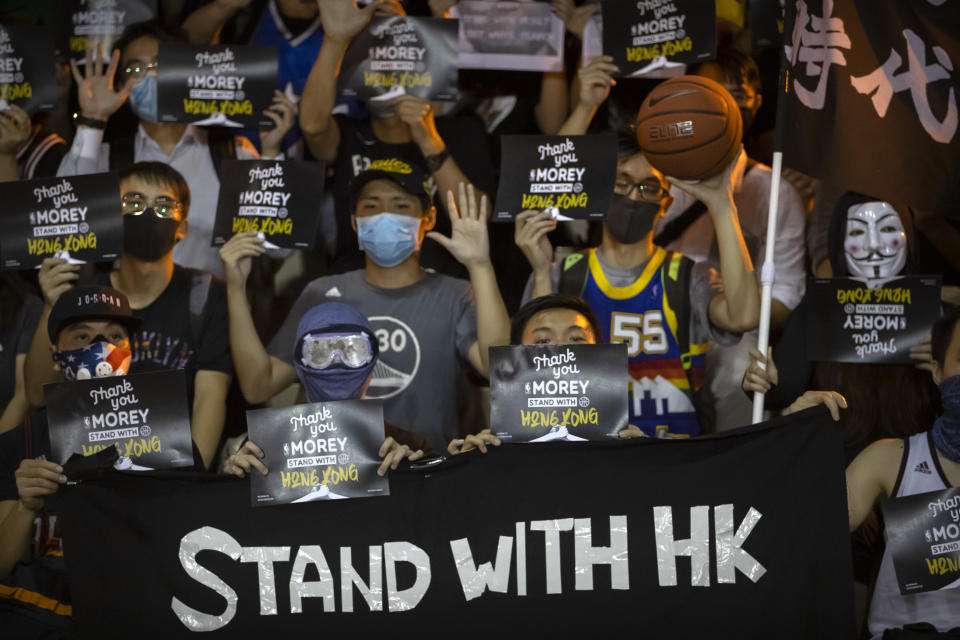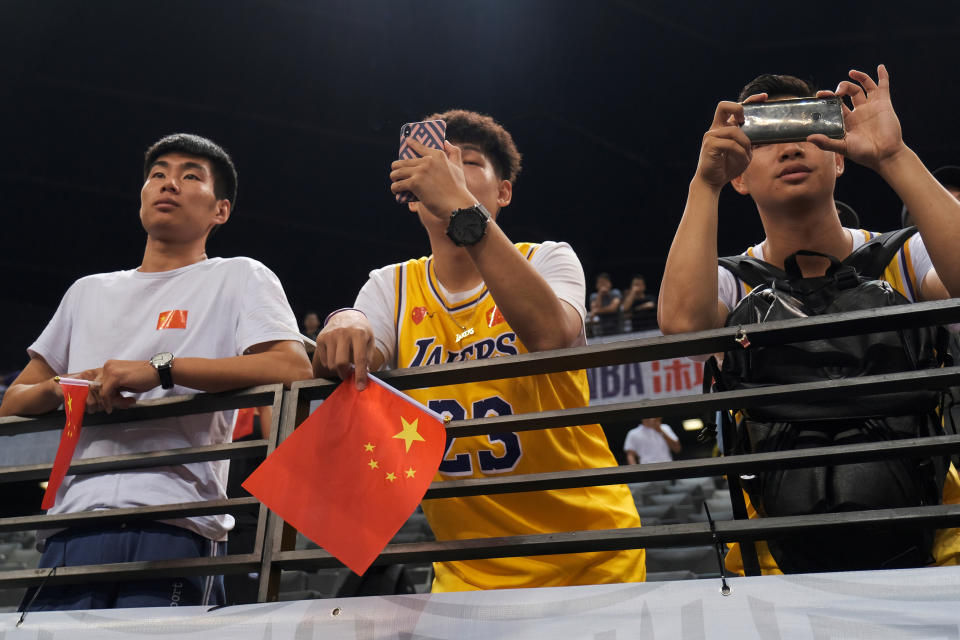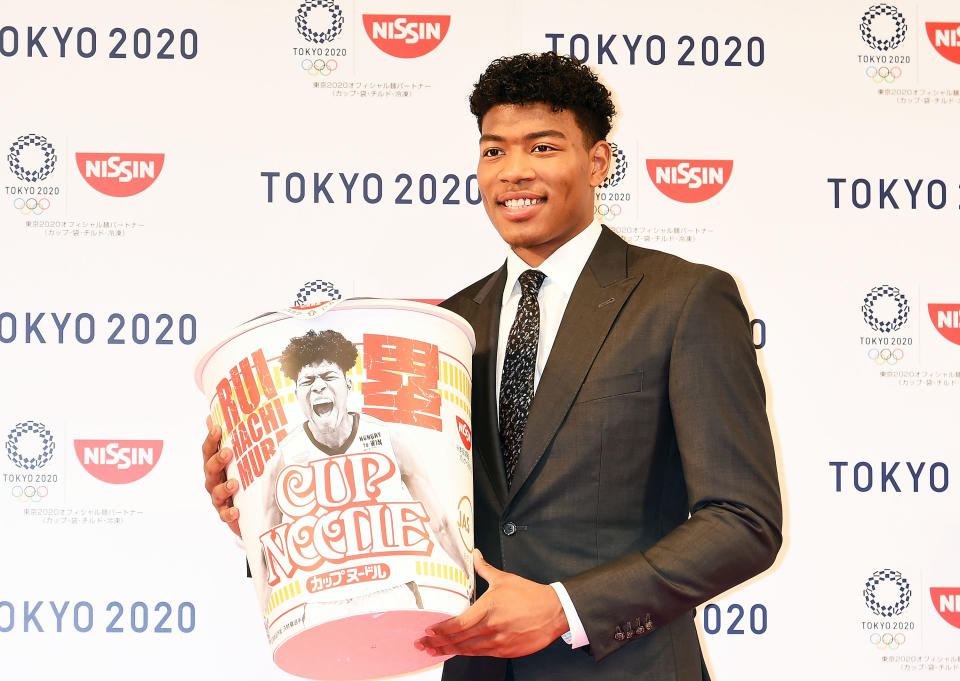Why the NBA really needs China
The NBA spent the month of October navigating its China problem, after Houston Rockets GM Daryl Morey tweeted a single image on Oct. 4 in support of Hong Kong protesters, which angered the NBA’s business partners in China.
Amid the fallout, many media pundits have suggested the NBA has more economic leverage over China than people might assume, and can even win a prolonged standoff.
But the NBA is actually far more reliant on China than has previously been reported.
China is the most significant growth market for the NBA and already accounts for nearly 10% of the league’s global revenue, Yahoo Finance has learned from multiple sources close to the league, including current and former NBA team executives. The NBA sees China as crucial to its financial future.
NBA revenue from China: nearly 10% and crucial to growth
After the Morey tweet, the NBA issued a statement in which it acknowledged the tweet “deeply offended many of our friends and fans in China, which is regrettable.” The statement was seen by many as an apology to China. Soon afterward, Commissioner Adam Silver clarified that the league “will not put itself in a position of regulating what players, employees and team owners say or will not say on these issues. We simply could not operate that way.” Silver has also publicly claimed that the Chinese government asked him to fire Morey, and declared, “There’s no chance that’s happening.”
The financial damage to the NBA’s business in China has been “fairly dramatic,” Silver has acknowledged. China Central Television stopped airing Rockets games, Tencent stopped streaming them, Alibaba pulled Rockets merchandise from its online NBA store, and Anta suspended sneaker contract renewal talks, to name just a few examples.
The NBA is not a public company, so its P&L is not publicly known. (The NBA, when asked for comment for this story, pointed to its recent statements as well as Silver’s public comments.)
It has been widely reported that the league’s global revenue is closing in on $10 billion per year, which puts it very close to Major League Baseball’s $10 billion and change, and still a distance from the NFL’s $15 billion.
Within that, revenue coming from China is now nearly 10% of the pie, Yahoo Finance has learned. (Other reports have placed the NBA’s China revenue at 15%-20% of the global pie, but that range is overstated.)
More importantly, its business in China is growing at a faster rate than in the U.S., and only smaller emerging markets such as India, Africa, and Latin America have faster revenue growth rates, since they are building from a low base.
NBA China, the separate company the league set up in 2008 to manage its deals there, is now valued by the league at $5 billion, a figure first reported this month by Sports Business Journal and confirmed to Yahoo Finance by multiple sources. That’s a valuation akin to the ones that investment firms apply to private tech startups, not to be confused with the revenue the league is bringing in from China.
$5 billion is what the NBA thinks it could fetch if it ever spun that business off. Just one year ago, the valuation was $4 billion.

The league’s two biggest partners in China are Alibaba (BABA) and Tencent (TCEHY), China’s two largest tech companies by market cap. The NBA re-upped its existing deals with both of those partners this year—before the Morey tweet happened.
The new deal with Alibaba includes licensed NBA merchandise on Alibaba’s ecommerce sites (Alibaba had been selling licensed NBA merchandise on Tmall since 2012), plus a dedicated NBA section with original content and game highlights across Alibaba’s networks Tmall, Taobao, and Youku. That deal puts NBA content in front of 700 million Chinese consumers.
Alibaba executive Joe Tsai’s purchase last summer of the Brooklyn Nets (the 51% stake he did not already own) put a $2.35 billion valuation on the Nets, and likely boosts the price tag other teams can sell for as well. It also brought Alibaba even closer to the NBA, since Tsai is now a full team owner. (Tsai published a public letter on Facebook criticizing Morey’s Hong Kong tweet.)
Tencent has been the “official digital partner of the NBA in China” since 2015. The extended deal with Tencent includes live game broadcasts (Tencent is the exclusive provider of NBA League Pass in China) plus additional video content on Tencent’s extensive list of sites and apps, including QQ, WeChat, and Weishi (Tencent’s version of Vine). As part of the renewed deal, Tencent promised to “help the NBA expand its fanbase in China and provide the league’s global fanbase with new, customized interactive services.”
The league has said 490 million Chinese fans watched NBA games on Tencent during the 2018-2019 season, “nearly three times” the number that watched just four seasons earlier. That gives a rough sense of how fast the NBA’s fanbase in China is multiplying.
The Tencent deal has been widely reported as being worth $1.5 billion over the next five years, or $300 million per year, a number that sources close to the league confirm. That is more than twice the value of the previous deal signed in 2015, which was $700 million over five years. But the new Tencent contract has not actually kicked in yet, which makes the squabble prompted by the Morey tweet especially unlucky timing for the league. The value of the Alibaba deal to the NBA has not been reported.
The NBA also announced a content deal last year with ByteDance, the parent company of the wildly popular video app TikTok. That’s three new partnerships with Chinese tech names in the last 12 months.

The motivation: ‘China stands the tallest’
NBA front office leadership and individual team executives see China as the most crucial growth market for the league to keep up its financial momentum.
“If you think about the revenues in America, the majority of revenues are fixed,” says one former NBA team executive speaking not for attribution. “The TV contract [with ESPN and TNT, extended through 2025] is set for another six years. Every team can grow its business organically with tickets and sponsorships, but only really at a modest clip. So when you think about the enterprise of the NBA, the growth potential is international, and within that, China stands the tallest.”
Indeed, NBA teams were just recently given a longer leash to make their own sponsorship deals in China thanks to a rule change just this year that freed up teams to sell sponsorships outside the U.S. Teams can now sell sponsorships in other countries (think China) for its team logos and marks, though they cannot do so domestically. (So, the New York Knicks can’t do a big marketing push with team signage in Texas, but can in Beijing.) The Washington Wizards were the first to act on the new rules, signing the first NBA team sponsorship deal in Japan.
A decade ago, Stephon Marbury was the singular example of an NBA player who had achieved mega-stardom in China. Now Kobe Bryant, LeBron James, Kevin Durant and many more have obsessive followings there. Klay Thompson and Gordon Hayward have deals with Chinese sneaker brand Anta; Dwyane Wade, CJ McCollum, and Michael Carter-Williams have deals with Chinese sneaker brand Li-Ning. Those deals bring personal revenue separate from the league, but the league loves and encourages them, since it boosts exposure for all. “There are tremendous opportunities for the players in China, and that trickles to the teams,” says the former team executive.

And the NBA’s China push isn’t just about the teams and leagues boosting revenue, it’s also about the individual players as global brands.
For now, China political tension is not something other U.S. pro leagues like the NFL have had to deal with; the NBA got there first, and is now navigating the benefits and the consequences. “The NBA, more so than any other league, is poised to continue its international growth” in China, says USC sports marketing professor David Carter. “The NBA and China will find a way to continue working together, even if doing so remains delicate.”
‘Anyone who expects the NBA to stand up to China is being unrealistic’
All of the financial metrics reinforce why the NBA can’t walk away from China, and why Silver must continue to play the friendly ambassador, even amid President Trump’s trade war and even as politicians have scored points by slamming the league for its chummy business ties in China.
Vice President Mike Pence this month said the NBA is “acting like a wholly owned subsidiary of China.” Texas Sen. Ted Cruz, in an interview with Yahoo Finance, dinged the league for its initial handling of the Morey tweet: “It was not the NBA’s finest hour, putting out one profuse apology after another,” though he conceded, “They have gotten better… after the first prostrations.”
The NBA is hardly the only American business trying to thrive in China while also navigating potential political blowback for being there. Apple, Nike, and Starbucks sales are booming in China. Apple CEO Tim Cook has taken heat multiple times over the past few years for actions aimed at pleasing Chinese regulators.
Gordon Chang, author of the book “The Coming Collapse of China,” says it’s no surprise that the NBA and other businesses are doubling down on China, but warns a reckoning is coming. “The Chinese economy is slumping fast, certainly not growing at the 6% pace they claimed in Q3,” Chang says. “When the Chinese economy falls apart, people are going to say, ‘Why the hell was the NBA in China in the first place?’ It’s a militant state, and anyone who touches that militant state is doing so at their own risk. So there is a reputational risk for the NBA, but financial gain in the short term. Businesses make decisions based on their pocketbook, and anyone who expects the NBA to stand up to China is being unrealistic.”
The Morey tweet situation unfolded amid the NBA preseason, and days before the Los Angeles Lakers played a preseason game in China. The regular season tipped off on Oct. 22, and since then, players have widely gone silent on the China issue. (After LeBron James criticized the Morey tweet and was roundly slammed, he said he would not comment further). As Bob Dorfman of Baker Street Advertising says, “The strategy seems to be, Let’s just keep quiet and the situation will go away. It’s freedom of speech vs. the power of the dollar. And right now, the power of the dollar seems to be winning.”
China has 1.3 billion people, and the NBA has said 500 million of them are NBA fans; the league is set on converting the rest.
What comes next: Africa, India
Exactly 40 years after its first game in China (the Washington Bullets played a Chinese Army team in 1979), the NBA played its first game in India this month.
The league is targeting India, with a population of 1.37 billion, as its next growth market. But building that business is far more challenging than growing in China, since India has a per capita income of $150 per month and does not have a long history of loving basketball. On the other hand, the NBA counts India as its largest Jr. NBA program (a partnership with the Reliance Foundation) in the world.
The NBA is building in India using the blueprint in Africa, where it first opened an office in 2010 and played its first games in 2015. This year the NBA announced it will launch Basketball Africa League (BAL), in partnership with the International Basketball Federation (FIBA) in 2020; the league will start with 12 African teams.
Nike (NKE) is already on board as the BAL’s official apparel outfitter—because American sponsors see the same potential dollars in these emerging markets as the NBA does.
—
Daniel Roberts is the sports business writer at Yahoo Finance. Follow him on Twitter at @readDanwrite.
Read more:
ESPN's Jay Williams on NBA in China: 'I would not advise any player to speak out on that'
Jaguars owner Shad Khan on NBA in China: 'You have to respect the norms'
NBA faces major political test after Houston GM's Hong Kong tweet
Joe Tsai buying Nets could usher in new era of foreign money in US sports
Follow Yahoo Finance on Twitter, Facebook, Instagram, Flipboard, LinkedIn, YouTube, and reddit.

